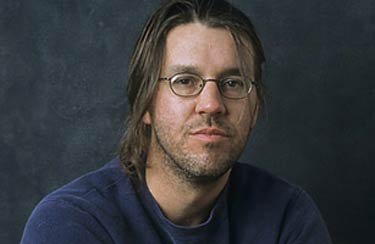Category Archive 'David Foster Wallace'
21 May 2020


The late David Foster Wallace.
I’m going to have to start reading Dale Peck‘s novels. He has the good taste to recognize that Pynchon, DeLillo, and especially David Foster Wallace are not any good.
The US literary world can be divided into two camps: those who think Thomas Pynchon is a very clever guy, and those who also think he’s a great writer. As it happens, I’m of the former camp. While I admit that Pynchon’s writing is packed with all sorts of ideas, ultimately the novels strike me as more crudités than smorgasbord: the appetisers keep coming (and coming, and coming), but the main course never arrives. Pynchon’s hallmarks are his tentacular – I might almost say his amorphous – prose, which can and does snare just about any philosophical concept or pop cultural phenomenon in its grasp; and his sense of satire, which can be awfully funny if your taste runs to broad humour. Neither of these traits is necessarily ruinous, but it’s Pynchon’s particular conflation of them that can limit his appeal. Given a choice between pathos and bathos, Pynchon errs on the side of farcical melodrama again and again (and again), and while I admire him for his efforts to undermine traditional narrative tyranny with humour rather than resorting to a Barth-style hatchet job, all four of his novels offer the same one-dimensional commentary on contemporary US society, and, in the end, a thirty-year writing career hasn’t produced a single memorable or even recognisably human character.
Pynchon does have his admirers, and he also has his followers, or people who are labelled his followers, and they do keep cropping up. I think there’s more than a little Pynchon floating around John Kennedy Toole, whose A Confederacy of Dunces is a book nearly as bloated as its protagonist; Don DeLillo’s social, um, satires owe more than a little to Pynchon’s work; and in a recent essay in Harper’s magazine the young novelist Jonathan Franzen declares Pynchon a personal hero. David Foster Wallace moves beyond admiration to adulation – if not, to put it more plainly, outright imitation. It is, in fact, a virtuoso performance that has eclipsed its progenitor: Wallace out-Pynchons Pynchon, and his third book, Infinite Jest, may well be the first novel to out-Gravity’s Rainbow Gravity’s Rainbow.
If nothing else, the success of Infinite Jest is proof that the Great American Hype Machine can still work wonders, in terms of sales. The novel has moved some 60,000 copies and racked up a stack of glowing reviews as thick as it is. What makes the book’s success even more noteworthy is that it is, in a word, terrible. Other words I might use include bloated, boring, gratuitous, and – perhaps especially – uncontrolled. I would, in fact, go so far as to say that Infinite Jest is one of the very few novels for which the phrase ‘not worth the paper it’s written on’ has real meaning in at least an ecological sense; but to resort to such hyperbole would be to fall into the rut that characterises many reviews of this novel.
As the preceding paragraph should make clear, I found Infinite Jest immensely unsatisfactory. I resent the five weeks of my life I gave over to it; I resent every endlessly over-elaborated gag in the book, like the ten-page riff on why video telephones are unviable, or the dozen pages on the teenager who won all his tennis games by playing with a pistol held to his head, or the thousands and thousands and thousands of words devoted to pharmaceutical trivia on all sorts of mind-altering drugs; and I resent especially the 96 pages of tinily typed and deliberately pointless endnotes and ‘errata’, 388 in total, which make the novel a two-bookmark experience. In a hoped-for effort at balance, I also slogged my way through Wallace’s freshman effort, a novel called The Broom of the System, which, at 450 pages, is a relative lightweight next to Infinite Jest; nevertheless, what the novel saves in brevity is more than made up for in banality. The only thing even remotely interesting about Wallace’s first novel is that it reads like a study for his second. Both novels are set in an imagined United States; both revolve around an emotionally disturbed family full of geniuses, cripples and money; both feature a manmade wasteland which becomes central to the national imagination (in The Broom of the System it’s called the Great Ohio Desert, which is why the book is set in Ohio of all places; in Infinite Jest it’s called the Great Concavity); both, most importantly, work up an elaborate – and elaborately digressive – plot which deliberately ends as unsatisfactorily as possible.
RTWT
07 Aug 2018


I cannot stand the scribblings of the pretentious, sanctimonious, vulgar voice of the hipster generation, David Foster Wallace, so I was naturally amused to read of the hilarious tumult surrounding the holding of the 5th Annual DFW Conference.
DFW was duly pious about the fate of the humble lobster, but he was also a bad boyfriend and a lech and even his suicide in 2008 will not protect him from the rage of the #MeToo Feminists.
The Outline gravely wrestles with all the intense moral issues here.
First, the flyers were defaced. Hung in the hallways of Illinois State University’s English department, the message was inked identically on each one: NAH I DON’T LIKE PREDATORS, above the clip-art lobster and below the promise of pizza.
This was mid-October 2017 — post-Weinstein, pre-C.K. The flyers announced an info session for a committee to plan and execute the school’s 5th-annual David Foster Wallace Conference. Wallace taught at ISU for nearly a decade; he wrote almost all his major works there, including the 1996 behemoth Infinite Jest. He also liked to sleep with his students, was abusive to his girlfriend at the time, the writer Mary Karr (whom he’d tried to push from a moving car not long before moving to Illinois in the summer of 1993, and also once hurled a coffee table at), committed statutory rape while away on book tour (or at least told a friend he did), and wrote to his friend Jonathan Franzen to say that he sometimes thought he was “put on earth to put his penis in as many vaginas as possible.â€
This stuff had been public knowledge for years (all of the above is drawn from D.T. Max’s 2012 Wallace biography, Every Love Story is a Ghost Story). But with Weinstein looped on cable news, Wallace’s past behavior seemed freshly reprehensible, and more people were willing to speak out against a school-sanctioned celebration of his work.
Ryan Edel, the conference’s chairman, took the flyers down and tried to forget about them. Edel, a big, soft-voiced Chicagoan with thick glasses and a graying beard, spent five years as a military linguist before going to ISU to get his Ph.D in 2011. As a general rule, conference chairs are experts in their field: authors of monographs, anthology intros, controversial journal articles. Edel, in contrast, had barely heard of Wallace when he took on the job in 2016. He just hadn’t realized that his more-or-less provincial university hosted a conference of international significance.
His ignorance of Wallace, who died by suicide in 2008, extended to the writer’s personal life. Edel had heard hints of bad behavior, and received at least one strongly worded letter from a member of the ISU community calling him out for “honoring someone who had taken advantage of women, particularly students,†as he described it. But stacked against all the deification of Wallace as a world-historical genius/saint, this stuff had failed to fully dent his consciousness. Now, he couldn’t post to the conference’s Facebook page without being asked point-blank how he justified celebrating an abuser. Maybe the monocled bone-bags over in Updike Studies would scoff at a question like that, and start pompously discoursing on the need to situate writers in their original context. But Edel started personally answering every angry Facebook comment, unambiguously condemning Wallace’s behavior in self-searching mini-essays that could run to five or six hundred words.
RTWT
31 Mar 2013


Samuel Taylor Coleridge (21 October 1772 – 25 July 1834)
Helen Rittelmeyer, Class of ’08, was chairman of the same conservative political and fraternal society I belonged to at Yale.
She recently published an admirably perceptive essay on the curiously close similarities between the early Romantic Coleridge and the contemporary hipster ironist David Foster Wallace. This piece has definitely made me into a fan and intended regular reader of this young author.
The… most important similarity between DFW and STC is that they both became famous too early, before their thinking was fully formed. Early fame is always an invitation to drug addiction, but early literary fame more so than other kinds. On top of the basic child-star problem—which is essentially that you’ve satisfied your desire to be extraordinary and foreclosed the possibility of being ordinary, leaving nothing left but to kill time as efficiently as possible until you drop dead—early literary fame involves the added burden of guilt.
Young writers become celebrities because the public sees something appealing in their worldview, or, to use a less grand word, their opinions. But no amount of precocity can make up for the fact that the opinions of a twenty-four-year-old who hasn’t done much living yet are worthless. When the writer grows up he realizes this, and he feels like a pied piper. That’s something child actors don’t have to live with. Christian Bale may feel so embarrassed by Newsies that he pitches a fit when interviewers ask him about it, but he doesn’t actually believe that that film made the world a worse place to live in.
For Coleridge, the false gods of his youth were democracy and revolution. Before the Lyrical Ballads and long before “Kubla Khan,†he had made a name for himself as a radical lecturer whose political themes were democracy and the abolition of property and whose religious themes were Unitarian (in the words of a contemporary, “to shew that our Saviour was the real son of Joseph and that the Crucifixion was a matter of small importanceâ€)—all in his mid-twenties. For Wallace, the false god was cleverness, the “manic patina over emotional catatonia†that comes with a certain type of avant-garde fiction.
In both cases these men later became convinced that the ideology they had embraced in their youth was not just misguided but at serious risk of bringing about a cultural apocalypse—England seeing a revolution like France’s, or American culture being completely cannibalized by irony. One way to deal with this was by embracing the opposite extreme, conservatism in Coleridge’s case and sincerity in Wallace’s. But that didn’t do anything to manage the guilt. Wallace tried to wear his burden lightly, with laughing comments like “Twenty-five-year-olds should be locked away and denied ink and paper,†but to an addict’s mind—which is already inclined to blame itself for all manner of things—the idea that he had done anything to hasten the cultural development he most dreaded must have been excruciating. Coleridge, too, became so concerned with making up for past sins that he wrote letters to the Tory prime minister outlining the best ways to make his administration more reactionary. All because the world made the mistake of paying attention to anything a twentysomething says.
Cyril Connolly wrote that those whom the gods would destroy, they first call promising. This of course was a take-off on the ancient proverb “Whom the gods would destroy, they first make mad.†Wallace and Coleridge were both called promising and both made mad, and then, in what must have seemed to them like the final cruelty, the universe declined to destroy them. That task, unfortunately, was left to them. Given that Coleridge died of complications from his addiction, the most we can claim for his way is that it was slower than Wallace’s.
Read the whole thing.

David Foster Wallace (February 21, 1962 – September 12, 2008)
Your are browsing
the Archives of Never Yet Melted in the 'David Foster Wallace' Category.
/div>

Feeds
|







